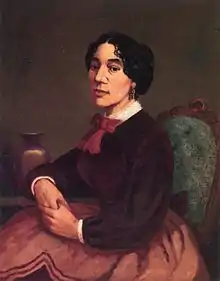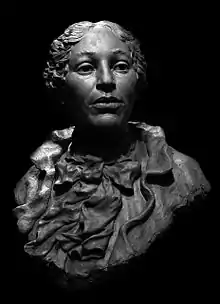Christiana Carteaux Bannister
Christiana Carteaux Bannister (1819–1902) was a business entrepreneur, hairdresser, and abolitionist in New England. She was known professionally as Madame Carteaux.
Christiana Carteaux Bannister | |
|---|---|
 Portrait by Edward Mitchell Bannister | |
| Born | Christina Babcock 1819 North Kingstown, Rhode Island |
| Died | 1902 (aged 83) |
| Other names | Madame Carteaux |
| Occupation | entrepreneur, hairdresser, and abolitionist |
Biography
Christiana Carteaux Bannister was born Christiana Babcock in 1819 in North Kingstown, Rhode Island.[1] She was born to African American and Narragansett Indian parents. She was a descendant of enslaved Africans who worked the plantations of South County, Rhode Island, during the eighteenth century.[2] As a young woman, she moved to Boston where she worked as a wigmaker and hairdresser.[2]
Marriage
Her first marriage was to Desiline Carteaux, a clothes dealer. Her marriage to Carteaux, believed to be of Caribbean origin, did not last.[2]
In 1853 Christiana and Edward Mitchell Bannister met when he applied for work as a barber in her Boston salon.[1] Her second marriage was to Bannister on June 10, 1857, who became one of the most successful Black artists because of Christiana Carteaux Bannister's financial and emotional support. Edward attributed much of his success to Christiana for her critical eye and her business sense.[1][2] In 1869 the Bannisters moved to Providence, Rhode Island, and Christiana continued her business as a hairdresser as well as her activism.[2]
Hairdressing business
As a young woman, Christiana moved from Rhode Island to Boston where she began her career as a wigmaker. She was professionally known as Madame Carteaux, Women's Hairdresser and Wigmaker.[3] She was a successful business entrepreneur, and self-styled "hair doctress," generating income by hairdressing and selling her own hair products.[4] From 1847 to 1871 Christiana Carteaux Bannister maintained several salons in Boston including Cambridge, Boston, and Winter Streets.[3] When Christiana Carteaux Bannister and Edward Bannister moved to Providence, she opened another salon in Providence.
Abolitionists

In Boston, the Bannisters lived and worked with Lewis Hayden and participated in the Boston Underground Railroad. The Bannister hair salons became popular meeting places for African American and white abolitionists.[1]
Other activism
During the Civil War, Christiana Carteaux Bannister was an advocate for equal pay for Black soldiers. In November 1864, she organized a fair sponsored by the Boston Colored Ladies Sanitary Commission to benefit the African American regiments, the 54th and 55th Massachusetts and the 5th Massachusetts Cavalry, who served for a year and a half without pay rather than accept less than the white soldiers were paid.[5]
In Providence, she founded the Home for Aged Colored Women when she learned about the struggles of African American women who worked as domestics but were too old to work and often became homeless.[1] The home moved from Transit St. to Dodge St. and was renamed Bannister House, Inc.[6]
Death and legacy
Despite her success throughout her professional life, Bannister died with little money in January 1903. Though she was admitted into the Home for Aged Colored Women in September 1902, Bannister reportedly lived with mental illness and was transferred to the Howard Asylum, Lancaster reported. Upon her death, she was laid to rest next to her husband, who died in January 1901 during a church prayer meeting, without a grave marker.
But years after her death, she began to receive more public recognition for her contributions to society and Black history. Bannister was inducted into the Rhode Island Heritage Hall of Fame in 2003, and a bronze bust of her, based upon a portrait Edward painted, was placed in the Rhode Island State House in December 2002.
References
- "Christiana Carteaux Bannister". Rise & Grind. Archived from the original on 22 May 2014. Retrieved 22 May 2014.
- "Christiana Carteaux Bannister". Rhode Island Heritage Hall of Fame. Retrieved 22 May 2014.
- Jacobs, Donald M. (1993). Courage and Conscience: Black & White Abolitionists in Boston. Indiana University Press. p. 162.
- Gates, Henry Louis (2004). African American Lives. New York, NY: Oxford University Press. p. 46.
- Blatt, Martin H (2001). Hope & Glory: Essays on the Legacy of the Fifty-Fourth Massachusetts Regiment. University of Massachusetts Press. p. 98.
- "Bannister House". Bannister House, Inc. Retrieved 22 May 2014.
Further reading
- Davis, Karen A. "Christiana Carteaux Bannister (1819–1902): A supporter of the arts and social causes." Women in R.I. History: Making a Difference. Providence: Providence Journal Co, 1994.
- Lancaster, Jane. " 'I Would Have Made Out Very Poorly Had It Not Been For Her': The Life and Work of Christianna Bannister, Hair Doctress and Philanthropist." Rhode Island Historical Society.
- Laxton, Glenn. "Christiana Bannister." Hidden History of Rhode Island: Forgotten Tales of the Ocean State. Charleston, SC: The Henry Press, 2009.